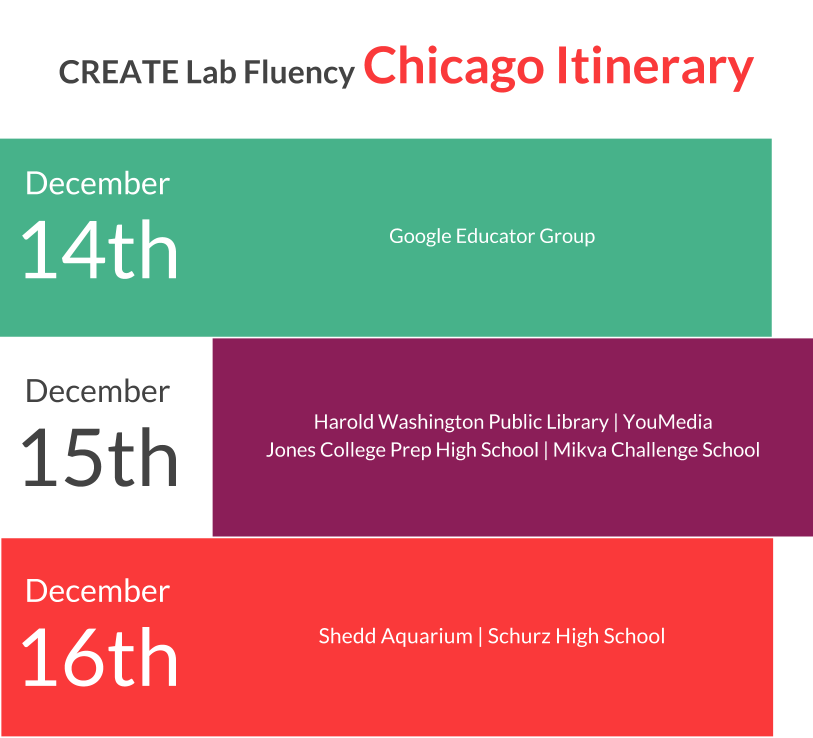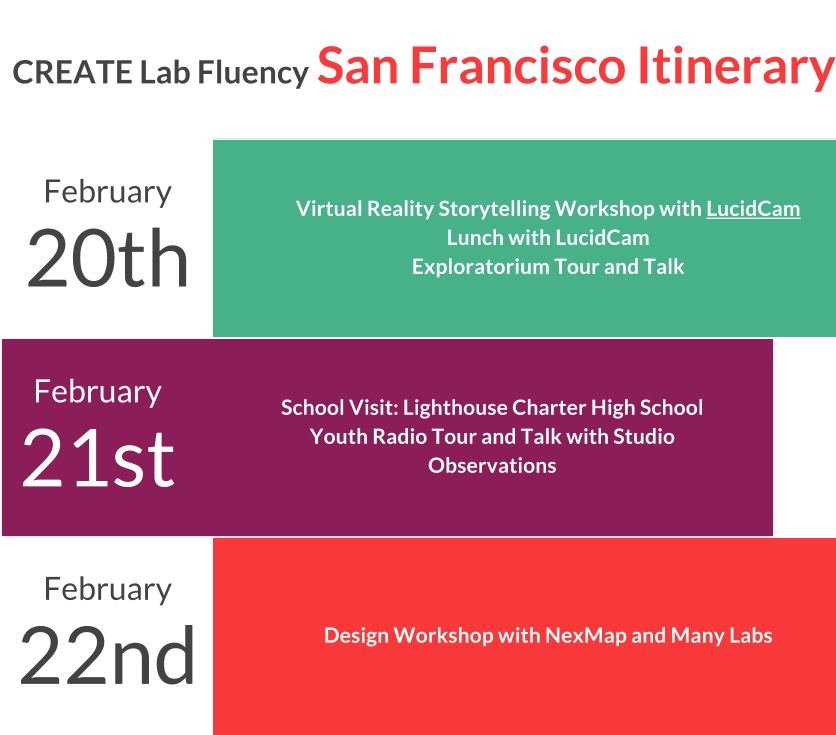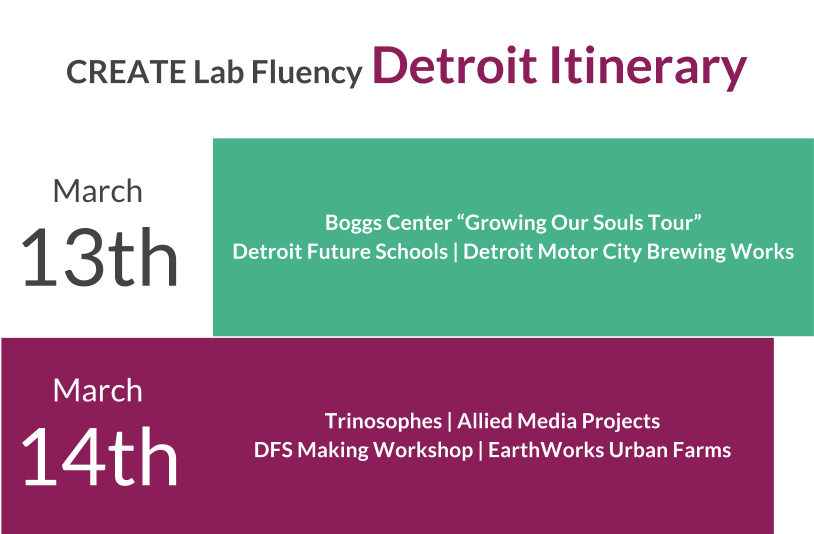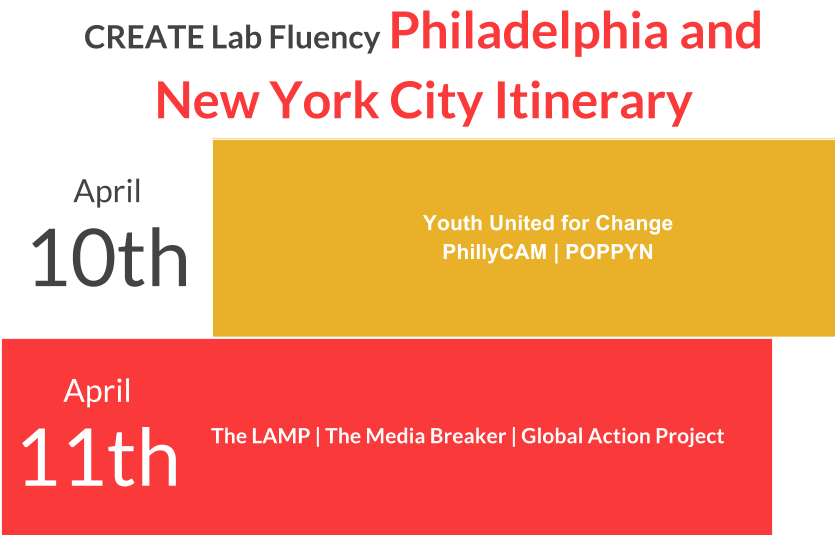Chicago
In December, we traveled to Chicago for three days, exploring the city and collaborating with its amazing educators.
Below are quotes from the Fluency Team on their experiences in Chicago.
“The Chicago trip energized me, especially the visit to Schurz High School. It was awesome to see a local chef and entrepreneur take such an interest in working with kids from many different approaches: scientific, business and data. Letting students experiment with methods for growing food, eating it in their meals and selling it to local restaurants is empowering! And the idea of generating, collecting, analyzing and sharing data during the growing process (e.g. in the MIT-designed box) to grow optimal vegetables was a really cool idea too!” –Lee Cristofano
“I was so inspired by our trip to Chicago that I filled 5 pages in my "idea book,” took 30 minutes of audio recordings and snapped a ton of pictures. I have reached out to our local library about replicating the amazing space at YouMedia in our own community. My principal is also on board to create a similar space here at our school. The creative efforts at Shedd Aquarium to promote and encourage conservation and recycling inspired me to design similar projects in our district-we are definitely making those recycling wreaths!” –Wendy Steiner
“Experiencing the YouMedia Lab in person made me look at my own school library, and my practice as a school librarian in new ways. Why can't I put up an easel and some oil paints in the Library and let kids paint at lunchtime? Who needs to wait for a boxful of fancy gadgets to have a MakerSpace when kids could be "making" with whatever is at hand? I have been in contact with Jaime Guerrero, the Schurz Food Lab and the Mikva Project since we returned, and am in the process of setting up a food pantry inside my high school. The trip was immensely creative and fruitful for me as an educator and a thinker.” –Sheila MayStein
"This trip would not have been the same without the questions, anecdotes, and perspectives that came from the entire group. I took as much from the discussions and questions as I did from the information being presented by our hosts. Hearing what people were hoping to do in their own schools to just the overall excitement that came with a group of teachers eager to learn made this trip exponentially worthwhile. As humans, we learn to assimilate to our surroundings. Because this group was so eager to learn, I guarantee I learned three times as much as I would have on my own with the same experiences. THANK YOU to everyone who made this trip so memorable! I came back completely invigorated and ready to implement awesome ideas all over again.” –Lindsey Lamm
“My favorite part of the trip was getting to know everyone better. I learned a lot about people's strengths by listening to the questions they asked and the things that made them excited. This helped challenge and shape my views about Fluency. I'm still wrestling with how this could work K-12, and I appreciated this extended time together to dig into brainstorming on this. My other favorite part was the coffee at Cafecito!” – Jessica Kaminsky
“Our Chicago site visits reaffirmed the promise of learning inherent to informal education spaces and opened a world of possibilities for formal learning spaces. Christa McAuliffe K-8 and Shurz High Schools embrace learning in all its forms - before, during, and after school hours. Chicagoans of multi-ages formed communities of caring and inspired me to examine and question traditional and non-traditional pathways we choose as learners.” -MaryLu Hutchins
“I loved walking through the Fluency process and tools- as a project in process – with our partners and friends in Chicago. From them, we learned about the reality of youth voice in action, and that though there can be constraints, there are so many opportunities when young people have the space to be themselves. I learned that this all happens through partnerships that build institutional fluency, interpersonal fluency, and finally tech fluency.” – Jessica Pachuta
“I cannot tell you just how significant this site visit was to my overall growth and development as an educator. I'm again amazed, having never considered informal education as a pathway, at just how powerful these experiences were - and the most noteworthy happening well outside of the typical school day.” - Jennifer Sylves-Lanas
San Francisco
In February, we visited San Francisco, gathering inspiration from their innovative learning spaces and technological developments.
Below are quotes from the Fluency Team on their experiences in San Francisco.
"At lighthouse, I saw inquiry being instilled from the youngest ages to be this disposition, to be a taught lens to see the world. As a kindergartner, “making and inquiry” was the lens you were exposed to and it was the only lens you knew to see the world. At Youth Radio, I saw they took care of people first. Youth radio or youth media was the vehicle. It was about that but it wasn't about that. It was first about taking care of people, making sure they had a safe place to be, making sure they felt value, and making sure that their voice was elevated. That was the foundation. I did have a big light bulb moment. It is easy to go somewhere and we see what other schools are doing and see lots of other schools’ maker spaces. But then I thought it is so easy to go somewhere and replicate the things that they have. It's so easy to do that. But, It's almost foolish or impossible to replicate the values that they have or the programming that they have. Because the values and programming that they have were built for the needs of those people. It's not built to take what they're doing and transpose it to your school, and it might not meet the needs of the people in your building."
-Brett Slezak
"The team at LucidCam described the camera as “LucidCam is emotional velcro.” VR allows a gateway and conduit to develop empathy and understanding, to form a relationship with my subject and an impetus, a reason to care. Sometimes that reason to care is connecting with a community. But in the case of the Exploratorium, it was really facilitating the exploration of science from a very practical hands-on methodology ... if children really want to learn by being tactile, it doesn't make sense to present them something that is abstract and theoretical but rather we should teach science or anything for that matter from that hands-on perspective."
-Jennifer Sylves-Lanas
"At the Exploratorium, they had this section that was the Social Sciences, about asking questions and starting conversations, and I thought that was an area I could work on because the social sciences felt soft for me. One of the topics was about public and private things, like who owns the air or space. You would play this card game and sort items into stacks that were either public or private. The card game was for you to quickly make a decision and discuss with a partner. It was inquiry-based and it was a leading question, leading us into this conversation about who owns what. This was a personal a-ha moment for me with the whole idea about fracking. I started changing my ideas when people who live near me started doing things that might affect the water that comes through my land. How is it going to affect our township and how people feel about moving? If you did this in a classroom, you could collect numbers and have something to chart, but then also have a narrative. “I could say that in my neighborhood, a mile down the road where I walk everyday, there is going to be a well drilled and that affects me and I want to tell you about it and that’s more than the numbers about the water quality.” So it was really this personal inquiry moment that happened while I was there."
-Beth Zboran
"At lighthouse, I saw inquiry being instilled from the youngest ages to be this disposition, to be a taught lens to see the world. As a kindergartner, “making and inquiry” was the lens you were exposed to and it was the only lens you knew to see the world. At Youth Radio, I saw they took care of people first. Youth radio or youth media was the vehicle. It was about that but it wasn't about that. It was first about taking care of people, making sure they had a safe place to be, making sure they felt value, and making sure that their voice was elevated. That was the foundation. I did have a big light bulb moment. It is easy to go somewhere and we see what other schools are doing and see lots of other schools’ maker spaces. But then I thought it is so easy to go somewhere and replicate the things that they have. It's so easy to do that. But, It's almost foolish or impossible to replicate the values that they have or the programming that they have. Because the values and programming that they have were built for the needs of those people. It's not built to take what they're doing and transpose it to your school, and it might not meet the needs of the people in your building."
-Brett Slezak
"The team at LucidCam described the camera as “LucidCam is emotional velcro.” VR allows a gateway and conduit to develop empathy and understanding, to form a relationship with my subject and an impetus, a reason to care. Sometimes that reason to care is connecting with a community. But in the case of the Exploratorium, it was really facilitating the exploration of science from a very practical hands-on methodology ... if children really want to learn by being tactile, it doesn't make sense to present them something that is abstract and theoretical but rather we should teach science or anything for that matter from that hands-on perspective."
-Jennifer Sylves-Lanas
"At the Exploratorium, they had this section that was the Social Sciences, about asking questions and starting conversations, and I thought that was an area I could work on because the social sciences felt soft for me. One of the topics was about public and private things, like who owns the air or space. You would play this card game and sort items into stacks that were either public or private. The card game was for you to quickly make a decision and discuss with a partner. It was inquiry-based and it was a leading question, leading us into this conversation about who owns what. This was a personal a-ha moment for me with the whole idea about fracking. I started changing my ideas when people who live near me started doing things that might affect the water that comes through my land. How is it going to affect our township and how people feel about moving? If you did this in a classroom, you could collect numbers and have something to chart, but then also have a narrative. “I could say that in my neighborhood, a mile down the road where I walk everyday, there is going to be a well drilled and that affects me and I want to tell you about it and that’s more than the numbers about the water quality.” So it was really this personal inquiry moment that happened while I was there."
-Beth Zboran
Detroit
In March, we visited Detroit and connected with their strong sense of community.
Below are quotes from the Fluency Team on their experiences in Detroit.
"I applied what we learned in Detroit to “Of Mice and Men” to ask the big question of “How much do they think poetry or a visual piece of art can have an impact on their own communicating changing people's levels of compassion for topics?” I wondered about ways to foreground the human lens in this text, and how to upgrade my outcomes objectives to prioritize advocacy or action. Then the students drew data about the character’s lives and their own lives, and noted factors that cultivated or depleted compassion in their own lives and the characters lives. They’ll be making a case with their reflection. And then “advocating” is in the products themselves, but also for something they care about. It prioritizes or advocates for a certain kind of learning and teaching, one that prioritizes outcomes that go beyond the artificial end of a grade or score but can actually have a potential larger impact beyond that."
-Kristen Fischer
"I asked, “How does this downed giant impact community?” ... Grace Lee Boggs said that she feels sorry for people who don’t live in Detroit. When something big blows up in your life, you get an opportunity to reconnect with those you love in new and creative ways. You also have a sense of what matters in live, you learn to have priorities, you don’t get caught up in the day to day minutia. I think that's why she feels sorry for us. She got to see systems fail and she got the opportunity to see hope and people prevail. "
-Sue Mellon
"It was surreal to be standing there at this moment in time listening to Rich [from the Boggs Center], like an encyclopedia about Detroit. It was the history that you don’t know and a lot of our kids, this is Fluency I’m talking about, this is our history, so they don't know how to be proud of themselves they don't know how to advocate for themselves. They're not healed enough from all of the trauma that they suffer in order to talk this talk and be successful. The fluency, if you have it it's going to lead to success, it's access to success. The history healed some of me and it gave me new life that I could take back in my classroom. Fluency has come to mean a purpose ... In order for you to know your purpose and your destiny, you gotta know who you really are. And that gives you the access to success. And it puts you on that journey ... That’s what I call Fluency. I had no idea that it was all of these different things"
-Donna Ervin
"I applied what we learned in Detroit to “Of Mice and Men” to ask the big question of “How much do they think poetry or a visual piece of art can have an impact on their own communicating changing people's levels of compassion for topics?” I wondered about ways to foreground the human lens in this text, and how to upgrade my outcomes objectives to prioritize advocacy or action. Then the students drew data about the character’s lives and their own lives, and noted factors that cultivated or depleted compassion in their own lives and the characters lives. They’ll be making a case with their reflection. And then “advocating” is in the products themselves, but also for something they care about. It prioritizes or advocates for a certain kind of learning and teaching, one that prioritizes outcomes that go beyond the artificial end of a grade or score but can actually have a potential larger impact beyond that."
-Kristen Fischer
"I asked, “How does this downed giant impact community?” ... Grace Lee Boggs said that she feels sorry for people who don’t live in Detroit. When something big blows up in your life, you get an opportunity to reconnect with those you love in new and creative ways. You also have a sense of what matters in live, you learn to have priorities, you don’t get caught up in the day to day minutia. I think that's why she feels sorry for us. She got to see systems fail and she got the opportunity to see hope and people prevail. "
-Sue Mellon
"It was surreal to be standing there at this moment in time listening to Rich [from the Boggs Center], like an encyclopedia about Detroit. It was the history that you don’t know and a lot of our kids, this is Fluency I’m talking about, this is our history, so they don't know how to be proud of themselves they don't know how to advocate for themselves. They're not healed enough from all of the trauma that they suffer in order to talk this talk and be successful. The fluency, if you have it it's going to lead to success, it's access to success. The history healed some of me and it gave me new life that I could take back in my classroom. Fluency has come to mean a purpose ... In order for you to know your purpose and your destiny, you gotta know who you really are. And that gives you the access to success. And it puts you on that journey ... That’s what I call Fluency. I had no idea that it was all of these different things"
-Donna Ervin
Philadelphia and New York City
In April, we visited Philadelphia and New York City, and saw examples of empowered young people.
Below are quotes from the Fluency Team on their experiences in Philadelphia and New York City.
"D.C. Vito's MediaBreaker studio is a thing of beauty. It's a polished product, just as most platforms developed via MacFound are. It looks user friendly and is a means to write video essays. With our students, and ourselves for that matter, consuming so much of our information via video feed, it's remarkable to think that this simple tool can help shift the balance of power and give viewers control of the message."
-Jennifer Lanas
"We are partnering with Fusfoo this year to provide an online platform to showcase student work in the area of digital storytelling. I liked listening to the young men [at Philly Cam] we met with and plan on working with students to assist them as they find stories to tell. The Lamp was great for encouraging students to question what is available to them in the mainstream media. I plan on trying to use their editing software with a social studies teacher while looking at the information that is being put out by different political organizations."
-Wendy Steiner
"D.C. Vito's MediaBreaker studio is a thing of beauty. It's a polished product, just as most platforms developed via MacFound are. It looks user friendly and is a means to write video essays. With our students, and ourselves for that matter, consuming so much of our information via video feed, it's remarkable to think that this simple tool can help shift the balance of power and give viewers control of the message."
-Jennifer Lanas
"We are partnering with Fusfoo this year to provide an online platform to showcase student work in the area of digital storytelling. I liked listening to the young men [at Philly Cam] we met with and plan on working with students to assist them as they find stories to tell. The Lamp was great for encouraging students to question what is available to them in the mainstream media. I plan on trying to use their editing software with a social studies teacher while looking at the information that is being put out by different political organizations."
-Wendy Steiner




